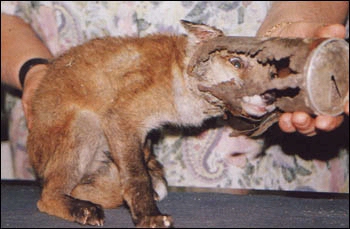

Home | Email | Join

Make your rubbish animal-friendly
Think before you throw away!

This unfortunate fox was found caught up in a trap which was formed from nothing more than a rusty drinks can. Household waste can become deadly when it ends up on a rubbish tip where animals search for food and every year thousands of such creatures die miserable deaths or suffer because of the thoughtless disposal of rubbish.
You can help by disposing of your rubbish safely and securely. Remember that out of sight does not mean out of mind. Rubbish that you put in a litter bin or secure dustbin may end up on an open rubbish tip where it can be harmful to animals.
Please make sure that your rubbish will not harm pets, farm animals of wildlife.
-
Plastic bags: Tie a knot in all plastic bags before disposing of them. Knotted bags are less likely to blow away. Also, animals are less likely to climb inside and suffocate. Birds and other animals scavenging on waste tips are less likely to confuse knotted bags with food and eat them. Rather than throwing them away, re-use your plastic bags. When you visit the supermarket, for example, bring your own bags with you for your shopping.
-
Cans: The best animal and environment-friendly option when it comes to cans is to recycle - contact your local county council to find out if there are any facilities in your area. If you must dispose of cans with your household waste, make sure that you remove the lid completely from your cans. Then drop the lid to the bottom of the can and firmly pinch the top shut. This stops the lid acting as a barb and trapping an animal's head as it nudges it into the tin.
-
Yoghurt pots: Remove the lids completely from yoghurt pots and scrunch the lids up. This reduces the risk of hedgehogs and other wildlife getting their heads stuck inside the pots.
-
Beer can binding: Always cut open the loops on the plastic binding that holds beer and soft drink cans together. This stops animals getting tangled up in the binding. Even better, buy drinks cans with a cardboard carrying pack instead - then recycle the cardboard.
-
Bottles and jars: Take all empty bottles and jars to a bottle bank. Glass can cause serious injuries and is a potential fire hazard so it should never be left lying around. If you can't recycle your plastic bottles, cut them in half before you throw them away (children should always be supervised when doing this). This way, small animals like mice and voles won't get trapped inside - it's easier to get into a bottle or jar than to get out as the insides are slippy and animals won't be able to get enough grip to escape.
-
Rubber bands: Snip rubber bands so that animals don't get caught up in them.
-
Solvents and oil: It is illegal to tip solvents or sump oil from cars down a drain as they can get into streams and rivers where they cause pollution. Some garages have collection points for used sump oil which can then be recycled.
-
Trolleys: Always return supermarket trolleys. They are a hazard to farm animals and wildlife which can get stuck in them.
-
Balloons: Never take part in balloon releases. Used balloons often end up in fields or the sea where animals can mistake them for food. Floating balloons look just like tasty jellyfish to sea birds and turtles. When throwing used balloons out with your household waste, cut them into tiny pieces.
For the sake of animals and the environment, recycle your rubbish
Remember the less rubbish you throw out, the better.
You can reduce your rubbish by not buying products which have a lot of unnecessary packaging and by making sure that any packaging or containers can be recycled.
Check to see what recycling facilities are available in your area. You may be easily able to recycle glass, paper, card, aluminium and steel cans and plastic. If these facilities are not available near where you live, contact your local county council and complain.
Disposing of your rubbish thoughtfully not only saves the lives of animals but it also helps to conserve the world's natural resources.
This section is based on information published by the RSPCA.



![]()
![]()


![]()
![]()

![]()